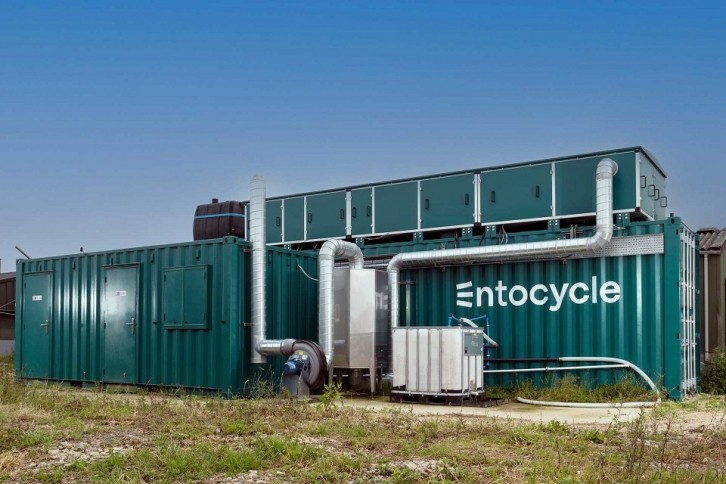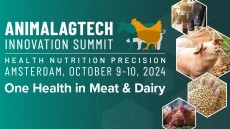Entocycle raises $2.6m for international expansion as new insect facility opens in Leeds

This financing effort follows on from the $5.4m the company raised in a Series A round in January 2023.
The investment comes from Blue Ledge Capital, Startup Basecamp, and Armajaro Holdings Limited, along with existing investors Climentum, Teampact, and TVC.
"The additional funding is a significant boost as we prepare to deploy insect facilities in multiple countries, further enhancing our profile and company valuation," said Keiran Whitaker, CEO of Entocycle.
"Many of our Series A investors from 2023 have reinvested, and we've attracted new investment from several reputable funds. This positions us well for a future Series B round," he told FeedNavigator.
The primary goals from the latest funding round include securing multiple contracts for the commercial-scale insect farms designed and built by Entocycle, either within the UK or internationally.
"We have several exciting projects in the pipeline," Whitaker stated. "There are a couple of strong prospects for a large-scale insect farm in the UK, potentially rivaling those already established in France and the Netherlands. Additionally, we are working on projects in Europe, North America, and Australasia, either underway or in the planning stages. This new funding allows us to undertake and complete these significant engineering projects."
"In the very near term, we're celebrating the successful completion of the wet commissioning of our Centre for Insect Technology in London," added the CEO.

Repurposing pig manure
In tandem with generating new capital, Entocycle has developed a new R&D insect farm for the National Pig Center at the University of Leeds, which is now operational. This facility supports research projects like the InSafe and DELIVER programs, backed by the UK’s national funding agency, UKRI-BBSRC.
The Securing the Future of the UK Insect Farming Industry (InSafe) program aims to establish protocols and standards for insect farming in the UK, including the use of non-permissive feedstocks like livestock manure and slurry for rearing insects. Meanwhile, the DELIVER project investigates the integration of insect farming with other technologies, such as anaerobic digesters and renewable energy systems, to create new income streams and commercial opportunities for UK farmers.
"The new facility is specifically designed to handle currently non-permissive waste streams, such as pig manure and slurry, which are being trialed under the InSafe project," explained Jude Bliss, Entocycle's marketing director. "These substrates are challenging to manage and unsuitable for small, lab-scale environments, necessitating a purpose-built system that is robust and easy to clean.
"The facility's size and the trays and racks used replicate industrial-scale production, providing a more accurate assessment of usage and impacts at that scale. This unit bridges the gap between small lab-scale experiments and the real-world, commercial-scale settings observed at some of the world's largest insect farms."
The research conducted by the university using the facility is making a crucial contribution to the legislative development of the insect industry in the UK, according to the spokesperson.
"A significant portion of the work is focused on assessing the safety and efficacy of insect farming as a solution to major agricultural environmental challenges, particularly the treatment and runoff of animal manure and its well-known environmental impacts.
"Black soldier fly (BSF) larvae serve as a biological barrier, preventing the transmission of pathogens and diseases even when processing substrates like animal manures. These trials will provide the scientific evidence required in the UK to approve its use as a feedstock, and we eagerly await the conclusions of this work.”
Integration of insect farming with anaerobic digestion
Asked about the benefits of integrating insect farming with anaerobic digestion (AD) for UK farmers, Bliss commented: "We are seeing significant interest from farmers and growers who are either considering alternatives to anaerobic digestion or looking to integrate insect bioconversion with their existing AD processes. There are several strong synergies between these technologies. For example, the heat generated from AD can maintain optimal environmental conditions for insect colonies. Since heat and energy usage are major operational expenses for insect farms, integrating AD can significantly reduce the operating costs (Opex) of an insect facility.
"Additionally, there's potential for insect frass (waste) to be used as a feedstock in AD systems. A well-integrated setup could allow farmers to maximize the valorization and upcycling of all waste streams. Moreover, the initial capital expenditure (Capex) can also be lowered, as many core infrastructure components may already be in place."

Partnerships
Entocycle has found an ideal partner in the University of Leeds and its Global Food and Environment Institute to advance much of the research needed to develop and accelerate the insect farming sector, said the representative.
"We're a collaborative company by nature," he continued, "and we're always open to exploring new partnerships, whether within the insect industry or beyond, as long as they offer mutual benefits and help us achieve our broad, shared goal of making global food systems more localized and sustainable."
Entocycle is also partnering with Bühler, a company known for its expertise and experience in executing large-scale engineering projects, said Bliss.
"We describe our approach as data-led and systems-wide. Our team consists of a balanced mix of entomologists and engineers who collaborate throughout the design, optimization, and delivery processes. Typically, companies in this sector either have a strong entomology focus or are heavily engineering-led, as seen with some of the larger players. We believe we've found a strong balance between these two areas, allowing us to deeply understand the biology and behavior of the flies and then design optimal conditions and environments to achieve the highest possible yields."



















